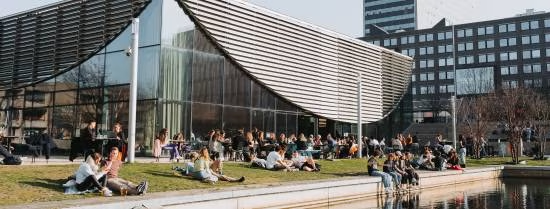Artificial Intelligence (AI) is becoming increasingly important within organisations and is changing the way people work. What exactly is changing? Is it positive or negative? PhD candidate Tessa Boumans is researching how technological innovations are transforming the clothing industry: "I am looking at how AI can improve the working conditions of people in this industry."
In September, the documentary festival 'AIdocs' is organised on our campus by the research group AIPact. Tessa is part of this 'Erasmus Initiative' that investigates how the use of AI benefits people and society.

Passion for your work
The festival is organised to bring AI closer to people and shows four documentaries with AI in the leading role. On 29 September, Tessa and colleague researcher Jess Bier will host the documentary 'You can't automate me'.
"It is about lashers in the port of Rotterdam. Lashers secure containers on sea-going vessels. It is physically demanding and dangerous work. For safety reasons, you would prefer to automate this work, but when you listen to the story of the workers, your perspective changes," says Tessa. "They are passionate about their work. The documentary shows that we need to look beyond working conditions when it comes to changes in an industry. People have a sense of value and meaning in their work, and you must take that into account. I see many similarities with my own research into the clothing industry."
"People have a sense of value and meaning in their work, and you must take that into account"
Will we soon be manufacturing clothes in the Netherlands again?
One theme of Tessa's research is 'reshoring': bringing the production process back 'home'. Over the years, the entire clothing industry has moved to Asia because of the cheap labour. "Now wages are slowly starting to rise there and with corona we have noticed that it is problematic to have such long chains in the production process. That's why there is more and more talk about the possibilities of bringing the production process back. AI is an important driver in this. At the moment, with our labour costs, it is impossible to mass-produce clothes here for the same price. Now, for reasons of environmental sustainability, you also have to ask yourself whether you want to do it on the same scale in the future. But if it becomes possible to automate factories, something that has so far been impossible due to the malleable properties of textiles, then new opportunities will arise to bring clothing production closer to home."
"Just like with the lashers in the documentary, you have to listen to the workers themselves. For a long time, big brands have had clothes made very cheaply in other countries, mainly Asia. It has provided work there. Often under the minimum wage and with poor working conditions. Not very sustainable work, but still work. The question is: is it socially acceptable to take away the production process again? You leave people behind without work. Who will then take care of their social security? The workers are exploited there, but I don't know if removing the production process from these countries is the right solution from an ethical point of view."
"The data provides more insight, but it is also a means of exploiting people"
“By tracking products, you also track employees”
Protecting employee data is also an important aspect of Tessa's research. Often employees are tracked indirectly. “Products are tracked, but then you also track your employees. Last year an article appeared about a Zara shop in Frankfurt with a new AI system. The garments in the shop are tracked with tags. It provides data about where everything is in the shop and how a product sells in a particular place. All to optimise the sales process. Interviews with staff showed that they were not happy with the changes. All creativity had disappeared from the work. One staff member even received emails from a manager asking why certain products had not yet been restocked. Someone was watching from a distance. You feel extremely watched. What would happen if something like this were to be introduced in a Bangladeshi garment factory? The data provides more insight, but it is also a means of exploiting people.”
It is all about what you do with it
According to Tessa, the clothing industry is pinning its hopes on technology to make the production process more transparent. Many big brands now don't know exactly where their clothes come from either. “It's all hidden away anyway. We would like to get more insight into that. EU regulation is also being prepared now in order to place the responsibility with the brands. Action groups are also pushing for more transparency. AI can mean a lot in this because you can see better and better where your products come from.”
“Technology in itself is never right or wrong. It's about what you do with it. You gain insight into a process, and you can do something with that. Transparency in itself does nothing. It all depends on which interests are taken into account and by whom. Ultimately, that determines whether it has a good social impact or not. In my research, I hope to map out exactly what is changing in the clothing industry, what technologies are being used and what that means for working conditions. And of course, with recommendations on how AI can be used in a good way.”
- PhD student
- More information
What does AI mean for individual citizens and society as a whole? Read more about the research of the Erasmus Initiative Societal Impact of AI.
- Related content

